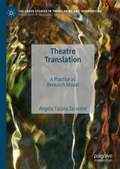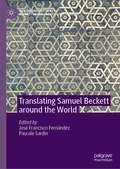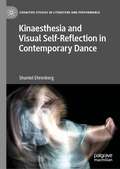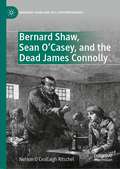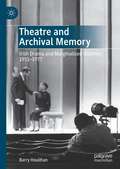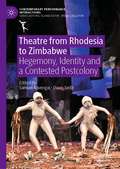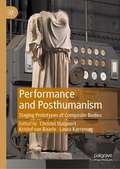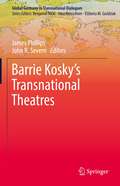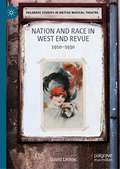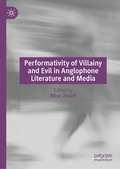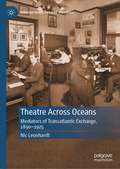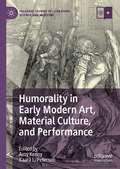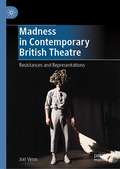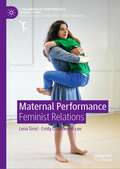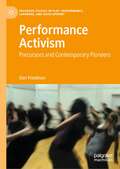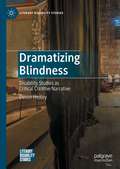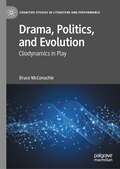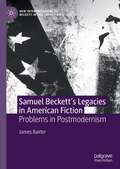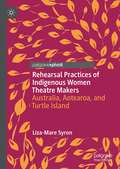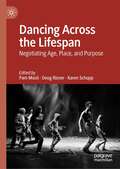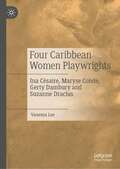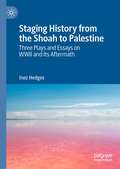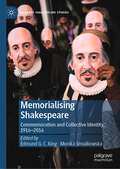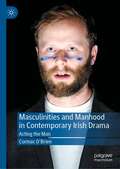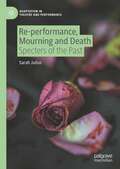- Table View
- List View
Theatre Translation: A Practice as Research Model (Palgrave Studies in Translating and Interpreting)
by Angela Tiziana TarantiniThis book examines the effects of translation on theatrical performance. The author adapts and applies Kershaw et al.’s Practice as Research model to an empirical investigation analysing the effects of translation on the rhythm and gesture of a playtext in performance, using the contemporary plays Convincing Ground and The Gully by Australian playwright David Mence which have been translated into Italian. The book is divided into two parts: a theoretical exegesis encompassing Translation Studies, Performance Studies and Gesture Studies, and a practical investigation comprising of a workshop where excerpts of the plays are explored by two groups of actors. The chapters are accompanied by short clips of the performance workshop hosted on SpringerLink. The book will be of interest to students and scholars in the fields of Translation Studies (and Theatre Translation more specifically), Theatre and Performance, and Gesture Studies.
Translating Samuel Beckett around the World (New Interpretations of Beckett in the Twenty-First Century)
by José Francisco Fernández Pascale SardinThe global reception of Samuel Beckett raises numerous questions: in which areas of the world was Beckett first translated? Why were Beckett texts sometimes slow to penetrate certain cultures? How were national literatures impacted by Beckett's oeuvre? Translating Samuel Beckett around the World brings together leading researchers in Beckett studies to discuss these questions and explore the fate of Beckett in their own societies and national languages. The current text provides ample coverage of the presence of Beckett in geographical contexts normally ignored by literary criticism, and reveals unknown aspects of the 1969 Nobel Prize winner interacting with translators of his work in a number of different countries.
Kinaesthesia and Visual Self-Reflection in Contemporary Dance (Cognitive Studies in Literature and Performance)
by Shantel EhrenbergKinaesthesia and Visual Self-reflection in Contemporary Dance features interviews with UK-based professional-level contemporary, ballet, hip hop, and breaking dancers and cross-disciplinary explication of kinaesthesia and visual self-reflection discourses. Expanding on the concept of a ‘kinaesthetic mode of attention’ leads to discussion of some of the key values and practices which nurture and develop this mode in contemporary dance. Zooming in on entanglements with video self-images in dance practice provides further insights regarding kinaesthesia’s historicised polarisation with the visual. It thus provides opportunities to dwell on and reconsider reflections, opening up to a set of playful yet disruptive diffractions inherent in the process of becoming a contemporary dancer, particularly amongst an increasingly complex landscape of visual and theoretical technologies.
Bernard Shaw, Sean O’Casey, and the Dead James Connolly (Bernard Shaw and His Contemporaries)
by Nelson O’Ceallaigh RitschelThis book details the Irish socialistic tracks pursued by Bernard Shaw and Sean O’Casey, mostly after 1916, that were arguably impacted by the executed James Connolly. The historical context is carefully unearthed, stretching from its 1894 roots via W. B. Yeats’ dream of Shaw as a menacing, yet grinning sewing machine, to Shaw’s and O’Casey’s 1928 masterworks. In the process, Shaw’s War Issues for Irishmen, Annajanska, the Bolshevik Empress, The Tragedy of an Elderly Gentleman, Saint Joan, The Intelligent Woman’s Guide to Socialism and Capitalism, and O’Casey’s The Story of the Irish Citizen Army, The Shadow of a Gunman, Juno and the Paycock, The Plough and the Stars, and The Silver Tassie are reconsidered, revealing previously undiscovered textures to the masterworks. All of which provides a rethinking, a reconsideration of Ireland’s great drama of the 1920s, as well as furthering the knowledge of Shaw, O’Casey, and Connolly.
Theatre and Archival Memory: Irish Drama and Marginalised Histories 1951-1977
by Barry HoulihanThis book presents new insights into the production and reception of Irish drama, its internationalisation and political influences, within a pivotal period of Irish cultural and social change. From the 1950s onwards, Irish theatre engaged audiences within new theatrical forms at venues from the Pike Theatre, the Project Arts Centre, and the Gate Theatre, as well as at Ireland’s national theatre, the Abbey. Drawing on newly released and digitised archival records, this book argues for an inclusive historiography reflective of the formative impacts upon modern Irish theatre as recorded within marginalised performance histories. This study examines these works' experimental dramaturgical impacts in terms of production, reception, and archival legacies. The book, framed by the device of ‘archival memory’, serves as a means for scholars and theatre-makers to inter-contextualise existing historiography and to challenge canon formation. It also presents a new social history of Irish theatre told from the fringes of history and reanimated through archival memory.
Theatre from Rhodesia to Zimbabwe: Hegemony, Identity and a Contested Postcolony (Contemporary Performance InterActions)
by Samuel Ravengai Owen SedaThe voices that are represented in this collection come from various parts of the world and express the views of practitioners and scholars who have all had first-hand experience working in Zimbabwean theatre from the last days of Rhodesia to Zimbabwe. The collection views the long continuum of developments in local theatre history as a case of the intrusive hegemonies that came with colonial Rhodesia as a conquest society, and localised identities in the form of the persistence of indigenous and syncretic popular forms. With time, all these came together to constitute the makings of a contested post-colony in contemporary theatre practice in Zimbabwe. The primary interest of scholars who are represented here is located at the intersection of political, cultural and performative discourses and the flow of Zimbabwean history. The focus, moreover, is not only on the history of performance cultures in postcolonial Zimbabwe - it extends its critical gaze to include the history of political ideas that gave rise to cultural contestation in the field of theatre and performance.
Performance and Posthumanism: Staging Prototypes of Composite Bodies
by Christel Stalpaert Kristof Van Baarle Laura KarremanRecent technological and scientific developments have demonstrated a condition that has already long been upon us. We have entered a posthuman era, an assertion shared by an increasing number of thinkers such as N. Katherine Hayles, Rosi Braidotti, Donna Haraway, Bruno Latour, Richard Grusin, and Bernard Stiegler. The performing arts have reacted to these developments by increasingly opening up their traditionally ‘human’ domain to non-human others. Both philosophy and performing arts thus question what it means to be human from a posthumanist point of view and how the agency of non-humans – be they technology, objects, animals, or other forms of being – ‘works’ on both an ontological and performative level. The contributions in this volume brings together scholars, dramaturgs, and artists, uniting their reflections on the consequences of the posthuman condition for creative practices, spectatorship, and knowledge.
Barrie Kosky’s Transnational Theatres (Global Germany in Transnational Dialogues)
by James Phillips John R. SevernThis book, the first of its kind, surveys the career of the renowned Australian-German theatre and opera director Barrie Kosky. Its nine chapters provide multidisciplinary analyses of Barrie Kosky’s working practices and stage productions, from the beginning of his career in Melbourne to his current roles as Head of the Komische Oper Berlin and as a guest director in international demand. Specialists in theatre studies, opera studies, musical theatre studies, aesthetics, and arts administration offer in-depth accounts of Kosky’s unusually wide-ranging engagements with the performing arts – as a director of spoken theatre, operas, musicals, operettas, as an adaptor, a performer, a writer, and an arts manager. Further, this book includes contributions from theatre practitioners with first-hand experience of collaborating with Kosky in the 1990s, who draw on interviews with members of Gilgul, Australia’s first Jewish theatre company, to document this formative period in Kosky’s career. The book investigates the ways in which Kosky has created transnational theatres, through introducing European themes and theatre techniques to his Australian work or through bringing fresh voices to the national dialogue in Germany’s theatre landscape. An appendix contains a timeline and guide to Kosky’s productions to date.
Nation and Race in West End Revue: 1910–1930 (Palgrave Studies in British Musical Theatre)
by David LintonLondon West End revue constituted a particular response to mounting social, political, and cultural insecurities over Britain’s status and position at the beginning of the twentieth century. Insecurities regarding Britain’s colonial rule as exemplified in Ireland and elsewhere, were compounded by growing demands for social reform across the country — the call for women’s emancipation, the growth of the labour, and the trade union movements all created a climate of mounting disillusion. Revue correlated the immediacy of this uncertain world, through a fragmented vocabulary of performance placing satire, parody, social commentary, and critique at its core and found popularity in reflecting and responding to the variations of the new lived experiences. Multidisciplinary in its creation and realisation, revue incorporated dance, music, design, theatre, and film appropriating pre-modern theatre forms, techniques, and styles such as burlesque, music hall, pantomime, minstrelsy, and pierrot. Experimenting with narrative and expressions of speech, movement, design, and sound, revue displayed ambivalent representations that reflected social and cultural negotiations of previously essentialised identities in the modern world. Part of a wide and diverse cultural space at the beginning of the twentieth century it was acknowledged both by the intellectual avant-garde and the workers theatre movement not only as a reflexive action, but also as an evolving dynamic multidisciplinary performance model, which was highly influential across British culture. Revue displaced the romanticism of musical comedy by combining a satirical listless detachment with a defiant sophistication that articulated a fading British hegemonic sensibility, a cultural expression of a fragile and changing social and political order.
Performativity of Villainy and Evil in Anglophone Literature and Media
by Nizar ZouidiPerformativity of Villainy and Evil in Anglophone Literature and Media studies the performative nature of evil characters, acts and emotions across intersecting genres, disciplines and historical eras. This collection brings together scholars and artists with different institutional standings, cultural backgrounds and (inter)disciplinary interests with the aim of energizing the ongoing discussion of the generic and thematic issues related to the representation of villainy and evil in literature and media. The volume covers medieval literature to contemporary literature and also examines important aspects of evil in literature such as social and political identity, the gothic and systemic evil practices. In addition to literature, the book considers examples of villainy in film, TV and media, revealing that performance, performative control and maneuverability are the common characteristics of villains across the different literary and filmic genres and eras studied in the volume.
Theatre Across Oceans: Mediators of Transatlantic Exchange, 1890–1925 (Transnational Theatre Histories)
by Nic LeonhardtTheatre Across Oceans: Mediators Of Transatlantic Exchange allows the reader to enter and understand the infrastructural 'backstage area' of global cultural mobility during the years between 1890 and 1925. Located within the research fields of global history and theory, the geographical focus of the book is a transatlantic one, based on the active exchange in this phase between North and South America and Europe. Emanating from a rich body of archival material, the study argues that this exchange was essentially facilitated and controlled by professional theatrical mediators (agents, brokers), who have not been sufficiently researched within theatre or historical studies. The low visibility of mediators in the scientific research is in diametrical contrast to the enormous power that they possessed in the period dealt with in this book.
Humorality in Early Modern Art, Material Culture, and Performance (Palgrave Studies in Literature, Science and Medicine)
by Kaara L. Peterson Amy KennyHumorality in Early Modern Art, Material Culture, and Performance seeks to address the representation of the humors from non-traditional, abstract, and materialist perspectives, considering the humorality of everyday objects, activities, and performance within the early modern period. To uncover how humoralism shapes textual, material, and aesthetic encounters for contemporary subjects in a broader sense than previous studies have pursued, the project brings together three principal areas of investigation: how the humoral body was evoked and embodied within the space of the early modern stage; how the materiality of an object can be understood as constructed within humoral discourse; and how individuals’ activities and pursuits can connote specific practices informed by humoralism. Across the book, contributors explore how diverse media and cultural practices are informed by humoralism. As a whole, the collection investigates alternative humoralities in order to illuminate both early modern works of art as well as the cultural moments of their production.
Madness in Contemporary British Theatre: Resistances and Representations
by Jon VennThis book considers the representation of madness in contemporary British theatre, examining the rich relationship between performance and mental health, and questioning how theatre can potentially challenge dominant understandings of mental health. Carefully, it suggests what it means to represent madness in theatre, and the avenues through which such representations can become radical, whereby theatre can act as a site of resistance. Engaging with the heterogeneity of madness, each chapter covers different attributes and logics, including: the constitution and institutional structures of the contemporary asylum; the cultural idioms behind hallucination; the means by which suicide is apprehended and approached; how testimony of the mad person is interpreted and encountered. As a study that interrogates a wide range of British theatre across the past 30 years, and includes a theoretical interrogation of the politics of madness, this is a crucial work for any student or researcher, across disciplines, considering the politics of madness and its relationship to performance.
Maternal Performance: Feminist Relations (Contemporary Performance InterActions)
by Lena Šimić Emily Underwood-LeeMaternal Performance: Feminist Relations bridges the fields of performance, feminism, maternal studies, and ethics. It loosely follows the life course with chapters on maternal loss, pregnancy, birth, aftermath, maintenance, generations, and futures. Performance and the maternal have an affinity as both are lived through the body of the mother/artist, are played out in real time, and are concerned with creating ethical relationships with an other – be that other the child, the theatrical audience, or our wider communities. The authors contend that maternal performance takes the largely hidden, private and domestic work of mothering and makes it worthy of consideration and contemplation within the public sphere.
Performance Activism: Precursors and Contemporary Pioneers (Palgrave Studies In Play, Performance, Learning, and Development)
by Dan FriedmanThis is the first book length study of performance activism. While Performance Studies recognizes the universality of human performance in daily life, what is specifically under investigation here is performance as an activity intentionally entered into as a means of engaging social issues and conflicts, that is, as an ensemble activity by which we re-construct/transform social reality. Performance Activism: Precursors and Contemporary Pioneers provides a global overview of the growing interface of performance with education, therapy, conflict resolution, civic engagement, community development and social justice activism. It combines an historical study of the processes by which, over the course of the 20th Century, performance has been loosened from the institutional constraints of the theatre with a mosaic-like overview of the diverse work/play of contemporary performance activists around the world. Performance Activism will be of interest to theatre and cultural historians, performance practitioners and researchers, psychologists and sociologists, educators and youth workers, community organizers and political activists.
Dramatizing Blindness: Disability Studies as Critical Creative Narrative (Literary Disability Studies)
by Devon HealeyDramatizing Blindness: Disability Studies as Critical Creative Narrative engages with the cultural meanings and movements of blindness. This book addresses how blindness is lived in particular contexts—in offices of ophthalmology and psychiatry, in classrooms of higher education, in accessibility service offices, on the street, and at home. Taking the form of a play written in five acts, the narrative dramatizes how the main character’s blindness is conceived of in the world and in the self. Each act includes an analysis where blind studies is explored in relation to disability studies. This work reveals the performative enactment of blindness that is lived in the public as well as in the private corners of the self, demonstrating how blindness is a form of perception. Devon Healey’s work orients to blindness as a necessary and creative feature of the sensorium and shows how blindness is a form of perception.
Drama, Politics, and Evolution: Cliodynamics in Play (Cognitive Studies in Literature and Performance)
by Bruce McConachieThis book outlines the evolution of our political nature over two million years and explores many of the rituals, plays, films, and other performances that gave voice and legitimacy to various political regimes in our species’ history. Our genetic and cultural evolution during the Pleistocene Epoch bestowed a wide range of predispositions on our species that continue to shape the politics we support and the performances we enjoy. The book’s case studies range from an initiation ritual in the Mbendjela tribe in the Congo to a 1947 drama by Bertolt Brecht and include a popular puppet play in Tokugawa Japan. A final section examines the gradual disintegration of social cohesion underlying the rise of polarized politics in the USA after 1965, as such films as The Godfather, Independence Day, The Dark Knight Rises, and Joker accelerated the nation’s slide toward authoritarian Trumpism.
Samuel Beckett’s Legacies in American Fiction: Problems in Postmodernism (New Interpretations of Beckett in the Twenty-First Century)
by James BaxterSamuel Beckett’s Legacies in American Fiction provides an overdue investigation into Beckett’s rich influences over American writing. Through in-depth readings of postmodern authors such as Robert Coover, Donald Barthelme, Thomas Pynchon, Don DeLillo, Paul Auster and Lydia Davis, this book situates Beckett’s post-war writing of exhaustion and generation in relation to the emergence of an explosive American avant-garde. In turn, this study provides a valuable insight into the practical realities of Beckett’s dissemination in America, following the author’s long-standing relationship with the countercultural magazine Evergreen Review and its dramatic role in redrawing the possibilities of American culture in the 1960s. While Beckett would be largely removed from his American context, this book follows his vigorous, albeit sometimes awkward, reception alongside the authors and institutions central to shaping his legacies in 20th and 21st century America.
Rehearsal Practices of Indigenous Women Theatre Makers: Australia, Aotearoa, and Turtle Island
by Liza-Mare SyronThis transnational and transcultural study intimately investigates the theatre making practices of Indigenous women playwrights from Australia, Aotearoa, and Turtle Island. It offers a new perspective in Performance Studies employing an Indigenous standpoint, specifically an Indigenous woman’s standpoint to privilege the practices and knowledges of Maori, First Nations, and Aboriginal women playwrights. Written in the style of ethnographic narrative the author affords the reader a ringside seat in providing personal insights on the process of negotiating access to rehearsals in each specific cultural context, detailed descriptions of each rehearsal location, and describing the visceral experiences of observing Indigenous theatre makers from inside the rehearsal room. The Indigenous scholar and theatre maker draws on Rehearsal Studies as an approach to documenting the day-to-day working practices of Indigenous theatre makers and considers an Indigenous Standpoint as a valid framework for investigating contemporary Indigenous theatre practices in a colonised context.
Dancing Across the Lifespan: Negotiating Age, Place, and Purpose
by Karen Schupp Doug Risner Pam MusilThis book critically examines matters of age and aging in relation to dance. As a novel collection of diverse authors’ voices, this edited book traverses the human lifespan from early childhood to death as it negotiates a breadth of dance experiences and contexts. The conversations ignited within each chapter invite readers to interrogate current disciplinary attitudes and dominant assumptions and serve as catalysts for changing and evolving long entrenched views among dancers regarding matters of age and aging.The text is organized in three sections, each representing a specific context within which dance exists. Section titles include educational contexts, social and cultural contexts, and artistic contexts. Within these broad categories, each contributor’s milieu of lived experiences illuminate age-related factors and their many intersections. While several contributing authors address and problematize the phenomenon of aging in mid-life and beyond, other authors tackle important issues that impact young dancers and dance professionals.
Four Caribbean Women Playwrights: Ina Césaire, Maryse Condé, Gerty Dambury and Suzanne Dracius
by Vanessa LeeFour Caribbean Women Playwrights aims to expand Caribbean and postcolonial studies beyond fiction and poetry by bringing to the fore innovative women playwrights from the French Caribbean: Ina Césaire, Maryse Condé, Gerty Dambury, Suzanne Dracius. Focussing on the significance of these women writers to the French and French Caribbean cultural scenes, the author illustrates how their work participates in global trends within postcolonial theatre. The playwrights discussed here all address socio-political issues, gender stereotypes, and the traumatic slave and colonial pasts of the Caribbean people. Investigating a range of plays from the 1980s to the early 2010s, including some works that have not yet featured in academic studies of Caribbean theatre, and applying theories of postcolonial theatre and local Caribbean theatre criticism, Four Caribbean Women Playwrights should appeal to scholars and students in the Humanities, and to all those interested in the postcolonial, the Caribbean, and contemporary theatre.
Staging History from the Shoah to Palestine: Three Plays and Essays on WWII and Its Aftermath
by Inez HedgesThis book is a contribution to the emerging field of research-based performance, which seeks to gain a wider audience for issues that are crucial to our understanding of history and to informing our future actions. The book examines the role of theater in portraying the Shoah in France, the French Resistance, and the Israeli-Palestinian conflict. Each of the three chapters consists of an original dramatic work by the author and an accompanying critical essay.
Memorialising Shakespeare: Commemoration and Collective Identity, 1916–2016 (Palgrave Shakespeare Studies)
by Edmund G. C. King Monika SmialkowskaThis book is the first comprehensive account of global Shakespeare commemoration in the period between 1916 and 2016. Combining historical analysis with insights into current practice, Memorialising Shakespeare covers Shakespeare commemoration in China, Ukraine, Egypt, and France, as well as Great Britain and the United States. Chapter authors discuss a broad range of commemorative activities—from pageants, dance, dramatic performances, and sculpture, to conferences, exhibitions, and more private acts of engagement, such as reading and diary writing. Themes covered include Shakespeare’s role in the formation of cultural memory and national and global identities, as well as Shakespeare’s relationship to decolonisation and race. A significant feature of the book is the inclusion of chapters from organisers of recent Shakespeare commemoration events, reflecting on their own practice. Together, the chapters in Memorialising Shakespeare show what has been at stake when communities, identity groups, and institutions have come together to commemorate Shakespeare.
Masculinities and Manhood in Contemporary Irish Drama: Acting the Man
by Cormac O'BrienThis book charts the journey, in terms of both stasis and change, that masculinities and manhood have made in Irish drama, and by extension in the broader culture and society, from the 1960s to the present. Examining a diverse corpus of drama and theatre events, both mainstream and on the fringe, this study critically elaborates a seismic shift in Irish masculinities. This book argues, then, that Irish manhood has shifted from embodying and enacting post-colonial concerns of nationalism and national identity, to performing models of masculinity that are driven and moulded by the political and cultural practices of neoliberal capitalism. Masculinities and Manhood in Contemporary Irish Drama charts this shift through chapters on performing masculinity in plays set in both the Irish Republic and Northern Ireland, and through several chapters that focus on Women’s and Queer drama. It thus takes its readers on a journey: a journey that begins with an overtly patriarchal, nationalist manhood that often made direct comment on the state of the nation, and ultimately arrives at several arguably regressive forms of globalised masculinity, which are couched in misaligned notions of individualism and free-choice and that frequently perceive themselves as being in crisis.
Re-performance, Mourning and Death: Specters of the Past (Adaptation in Theatre and Performance)
by Sarah JuliusThis book examines the recent trend for re-performance and how this impacts on the relationship between live performance and death. Focusing specifically on examples of performance art the text analyses the relationship between performance, re-performance and death, comparing the process of re-performance to the process of mourning and arguing that both of these are processes of adaptation and survival. Using a variety of case studies, including performances by Ron Athey, Julie Tolentino, Martin O’Brien, Sheree Rose, Jo Spence and Hannah Wilke, the book explores performances which can be considered acts of re-performance, as well as performances which examine some of the critical concerns of re-performance, including notions of illness, loss and death. By drawing upon both philosophical and performance studies discourses the text takes a novel approach to the relationship between re-performance, mourning and death.
